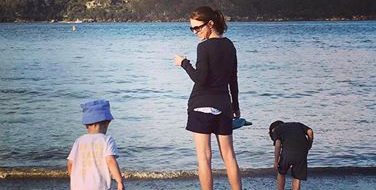Motherhood is inflicting violence upon me. It’s forcing me into (gag) optimism.
This is an uncomfortable spot, this seeing-the-glass-half-full hunt for silver linings. I am much better–and more experienced–at pointing out flaws. But lately, The Kid especially has grown frustrated with his corner of the world and all of its injustices: traffic, lack of parking spaces, people who say “one second” when they do not mean “one second.” And his frustration has ample room to fester within his comfort zone of home and family, since that’s virtually the only zone we can inhabit during lockdown.
Cut to us on the hunt for a park at the packed beach on this beautiful spring morning, and his protests from the backseat as we couldn’t locate a spot. My already-peaking (thank you, PMS, brain chemistry, and life) anxiety hit new highs with each protest. When we finally found a spot, it was “too far away.” My response: “We get some exercise.” Later, I heard all about how our sand neighbours had trampled our castle. “It was accidental,” I offered through gritted teeth.
Yesterday, this same child announced that he’d had “the worst day of his life” at the park just after he won a round of hide and seek. I heard this pronouncement from the ground as I was picking up the dog’s shit. The day was on its last legs, and so was I. I want to be the one to complain, not the one who has to buoy everyone else’s mood. I need to have space to break down.
It’s almost like I’m being asked to…change or something?
Or maybe it’s just that parts of me are being uncovered.
Little Brother leans in at bedtime and tells me, “You’re the one who makes me laugh the most,” and though I feel he may be lying because he also told me I’m “calmer than Dad,” I believe it when he whispers, half-asleep, “I love you.” And TK, in the darkness of his room that is pierced by the light of a street lamp that is “so annoying,” goes on to explain to me what’s going on in his mind when he gets frustrated: the thoughts that overtake him and don’t let go; the way autism can be a blessing but the disability part is when he gets overwhelmed. And I am overwhelmed: by how well he knows himself, and by the work we are doing together to make that happen.
One of our mornings this week at the beach–and this spring break, there have been many–I stood beside the boys as they each did their own thing: TK sent a plastic ship out to greet the waves and be hurtled back to shore, where he ran to retrieve it. LB jumped over the returning waves, shouting in glee. Years to get here: unasked-for twists that felt like deviations that were actually paths to this moment, to this life, where both of my kids are growing up on the beach and we can ride waves every day together.
We watched as a group of swimmers pushed a woman in a beach wheelchair out into the surf. Just straight into it. They removed her from the chair and held her under her arms for a few seconds (definitely not one second), and then she let go of them and dove under the water before paddling around and being brought back to shore. I thought of all the waves that have swept over me, that would have drowned me if I hadn’t been held. Sometimes we spend all our energy trying to make it past the breakers, or back to shore. Two weekends ago, that’s what TK and I did, and it was glorious once we reached the calm.
But other times, we stay still long enough to meet the break and survive it. And after we learn we can survive it, we figure out we can ride it. Then the sun hits the spray and, for one second, a rainbow appears. And we didn’t even have to hunt for it, because we just happened to be standing in the right place.










